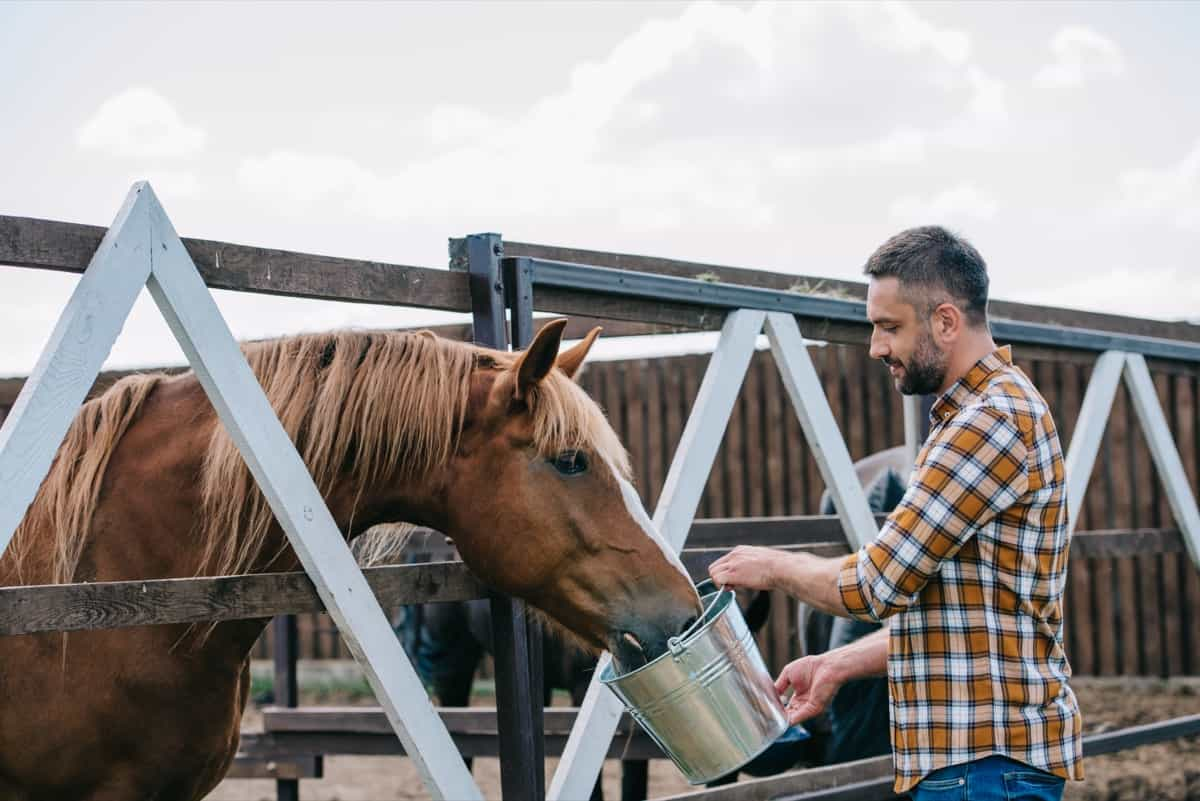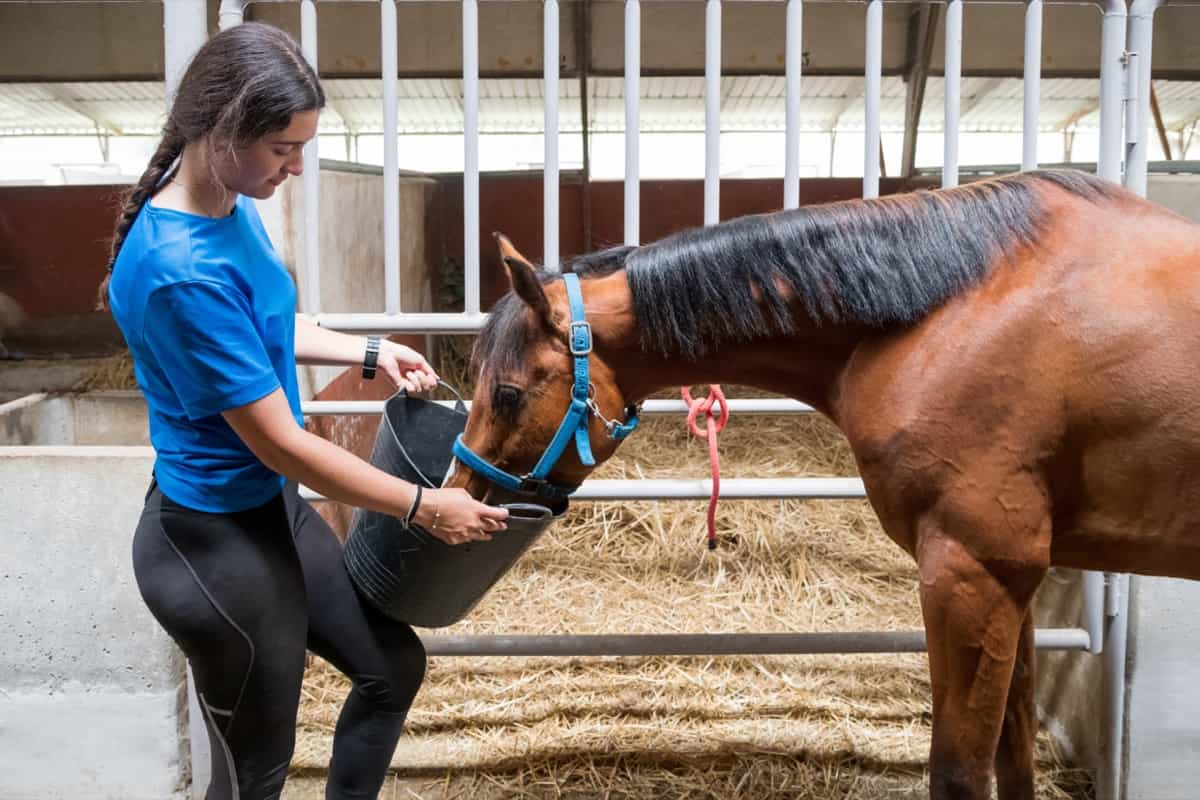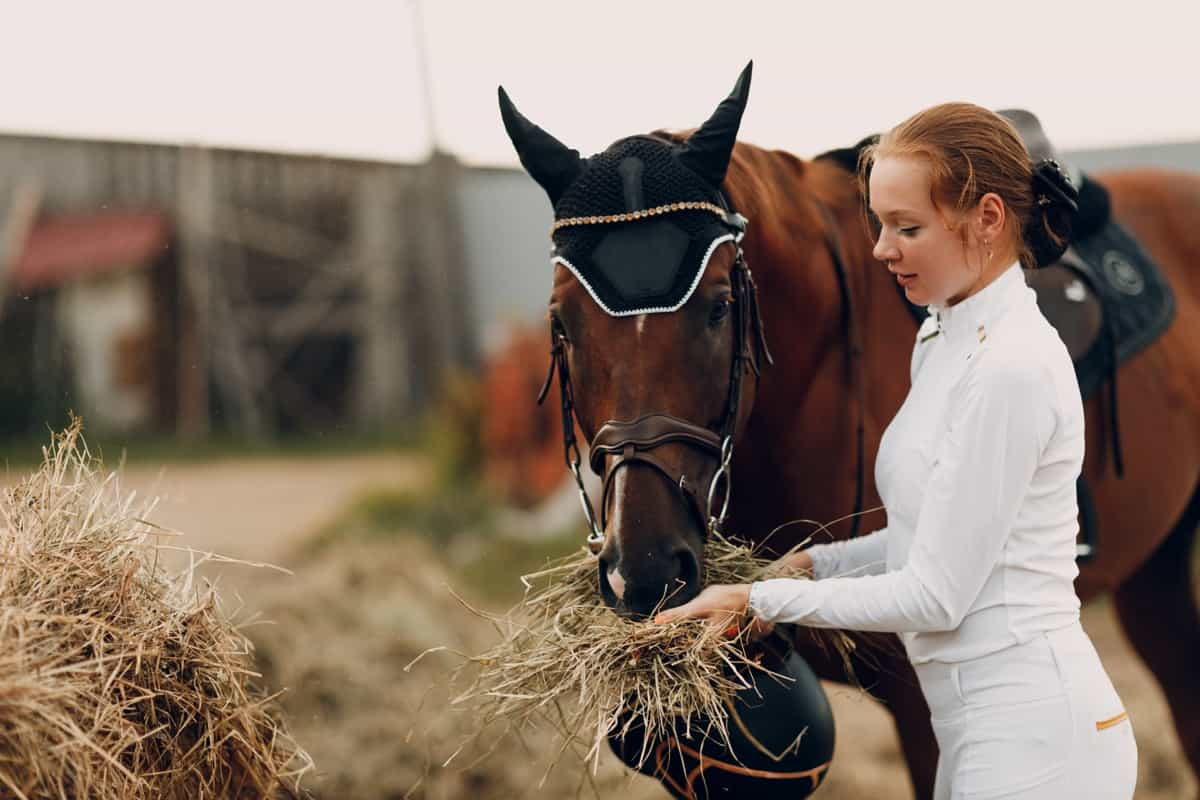Feeding plays a crucial role in the overall well-being and performance of horses. Like humans, horses require a balanced diet to maintain their health and vitality. A proper feeding regimen ensures they receive the essential nutrients for growth, energy, muscle development, and immune function. Horses have specific requirements that must be met through a balanced diet. This includes providing them with the right amount of protein, carbohydrates, fats, vitamins, and minerals.

Know About Horse Feeding
Nutritional Needs
Horses are herbivores, which means their diet primarily consists of plant-based foods. However, not all plants provide the necessary nutrients horses need to thrive. The main component in a horse’s diet is forage, such as hay or grass. Forages provide fiber that aids in digestion and helps maintain a healthy gut. Additionally, horses require carbohydrates for energy, protein for muscle development and repair, and fats for calorie intake and vitamin absorption.
Vitamins and minerals are also vital in a horse’s diet. These micronutrients play crucial roles in various bodily functions and in maintaining overall health. Calcium promotes bone strength, while iron contributes to blood production. The key nutrients include carbohydrates, fats, vitamins, minerals, and water.
The Importance of Proper Horse Feeding
Proper nutrition is important for the overall well-being and performance of horses. Like humans, horses require a balanced diet to maintain optimal health and energy levels. Feeding your horse the right nutrients can improve their growth, development, and immune system function. Supplements should also be considered based on your horse’s specific requirements.
In case you missed it: Everything You Need to Know About Horse Grooming: Step-By-Step Guide for Beginners

This may include vitamins, minerals, joint supplements, or probiotics. Establishing a regular feeding schedule for horses is another key consideration for beginners. Horses thrive on routine, and having consistent meal times helps maintain their digestive system’s functionality while providing them with the necessary energy throughout the day.
Essential Nutrients for Equine Health
Horses need carbohydrates for energy. This can be obtained from grass, hay, or grains. Horses get protein from alfalfa, soybeans, or other high-quality legumes. Adequate protein intake is crucial for growth and repair in horses. Vitamins and minerals are key in maintaining overall health and preventing deficiencies. Fats provide an additional energy source while aiding nutrient absorption and promoting healthy skin and coat. Water is perhaps the most important nutrient of all. Horses should have access to clean water at all times to prevent dehydration.
Different Types of Horse Feed
Horses are natural grazers and thrive on a diet with plenty of forage. Grass provides essential nutrients and fiber, while hay is a supplemental source when fresh pasture is limited. In addition to grass and hay, many horse owners supplement their horse’s diet with concentrates. These can include grains, such as oats or corn, and pelleted feeds that provide a balanced mix of vitamins and minerals. Some horses may also benefit from salt supplementation. Carrots and apples are popular treats for horses, but it’s important not to overdo it with sugary fruits.
Creating a Balanced Diet
The foundation of a horse’s diet should be good quality forage, such as hay or pasture grass. It’s important to assess the nutritional content of your chosen forage to determine if any supplemental feed is necessary. In addition to forage, horses may require concentrated feeds such as grains or pellets. Horses need plenty of clean water to stay hydrated and help regulate body temperature. When creating a balanced diet plan, monitoring your horse’s body condition score is important. A body condition score helps determine if adjustments need to be made based on weight gain or loss.
Feeding Schedule
Horses thrive on routine, and their digestive systems work best when fed regularly throughout the day. The minimum is to feed your horse at least twice daily, dividing their meals and times they are fed. The optimal horse feeding schedule would be meals three to five times daily. Start by providing access to good quality hay or pasture 24/7. This ensures that horses have a constant source of fiber in their diet, which is essential for maintaining proper function. Consult your veterinarian or equine nutritionist to determine the best plan for your horse’s needs.
In case you missed it: Top 10 Best Benefits of Horse Manure in Agriculture

Common Mistakes to Avoid
Overfeeding – It can be tempting to give your horse extra food as a way to show love or care, but this can lead to weight gain and even obesity. Remember that horses have specific nutritional needs, and sticking to the recommended feeding guidelines is crucial.
Underfeeding – Some beginners may underestimate their horse’s appetite or not provide enough food. This can result in malnutrition and poor overall health. Make sure you give enough forage, such as hay or pasture, based on your horse’s size and activity level.
Improper feed storage – If the feed isn’t stored properly, it can become contaminated with mold or pests, which can be harmful if ingested by your horse. Always store feed in a cool, dry place away from direct sunlight and rodents.
Special Dietary Considerations
The common health issue that affects horses is laminitis. This painful condition affects the hooves and requires careful attention to the horse’s diet. Typically, reducing sugars and carbohydrates in their feed is recommended. Providing access to grazing or offering small frequent meals can help prevent stomach acid buildup and reduce the risk of ulcer development.
Horses with metabolic disorders such as Equine Metabolic Syndrome (EMS) or Cushing’s disease require careful management of sugar, starch intake, and controlled portions of grass or hay. Consulting with a veterinarian is essential when addressing these conditions.
Supplements for Horses
Supplements can help address specific nutritional deficiencies or support certain aspects of your horse’s well-being. It’s essential to consult with a veterinarian or equine nutritionist who can assess your horse’s individual needs. They will consider age, breed, activity level, and any existing health conditions before recommending the appropriate supplements.
Common supplements for horses include vitamins and minerals, joint support formulas, digestive aids, and coat enhancers. These supplements come in various forms, like powders, pellets, or liquids. A healthy diet of high-quality hay or grass and appropriate concentrates should always be the foundation of your horse’s nutrition.
Monitoring and Adjusting Your Horse’s Diet
It’s important to monitor your horse’s body condition regularly. Please pay attention to their weight and muscle tone. Next, keep an eye on their energy levels and performance during exercise. If you notice any changes in behavior or decreased performance, it could indicate that something is off with their diet.
Consider working closely with a veterinarian or equine nutritionist who can help analyze your horse’s dietary needs based on age, breed, workload, and any specific health conditions they may have. Introduce new feeds slowly over several days while monitoring how your horse responds.
In case you missed it: Homemade Horsetail Spray for Pests and Disease Control: Recipe for Organic Benefits of Plants

Frequently Asked Questions
Can Horses Eat Fruits and Vegetables?
Some fruits and vegetables can provide additional vitamins and minerals to your horse’s diet; however, certain fruits, like apples, should be fed in moderation due to their high sugar content.
What Types of Food Can Horses Eat?
The primary components of a horse’s diet are grass and hay/haylage. However, additional feed, such as mineral supplements, may be necessary depending on your horse’s requirements. Concentrates like grains or pellets can also be included in their diet but must be carefully balanced.
How Do I Create a Balanced Diet for My Horse?
To create a diet for your horse, provide good quality hay or pasture grass as the foundation. Supplement this with concentrates if needed, but ensure you don’t overfeed them as it can lead to obesity.
How Much Should I Feed My Horse?
The quantity of food a horse needs depends on several factors, including size, age, activity level, and overall health. Generally, horses should consume about 2% of their body weight in forage daily. This can be in the form of hay or pasture grazing.
Conclusion
Feeding your horse properly ensures they receive the essential nutrients and helps prevent any dietary-related issues. Horses have specific dietary requirements for age, breed, activity level, and overall health. Providing horses with the right combination of proteins, carbohydrates, fats, vitamins, minerals, and water is essential for optimal health.
- Feed Your Flock for Less: Top 10 Tips to Save on Chicken Feed
- Ultimate Guide to Ossabaw Island Hog: Breeding, Raising, Diet, and Care
- Hatching Answers: The Top 10 Reasons Your Chickens Aren’t Laying Eggs
- Eggs and Economics: Breaking Down the Cost of Raising Backyard Chickens
- Defend Your Greens: Proven Methods to Keep Iguanas Out of Your Garden
- Ultimate Guide to Cinnamon Queen Chicken: A Comprehensive Guide for Beginners
- Ultimate Guide to California Tan Chicken: Breeding, Raising, Diet, Egg-Production and Care
- Ultimate Guide to Marsh Daisy Chicken: Breeding, Raising, Diet, and Care
- 10 Types of Chicken Farming Businesses You Can Start for Profits